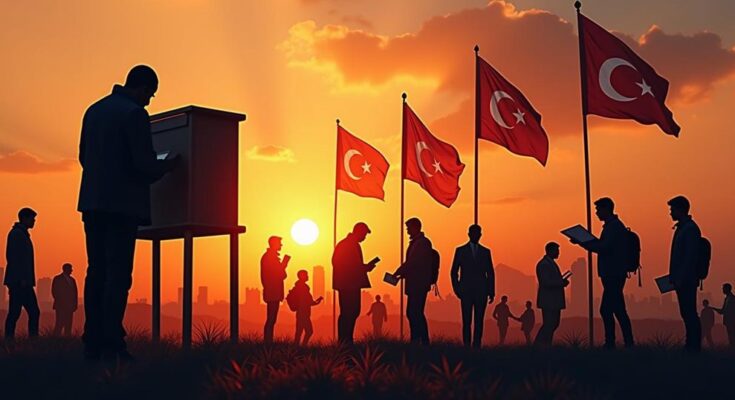Tunisia’s presidential election has begun, with President Kais Saied expected to win amid the imprisonment of key opponents, raising concerns over the legitimacy of the electoral process. Approximately 9.7 million voters are eligible, but many express disillusionment and skepticism about the effectiveness of their votes. The political landscape has shifted dramatically since Saied’s power consolidation in 2021, with significant repression of dissent and economic challenges further diminishing public enthusiasm for the election.
Voting has commenced in Tunisia’s presidential election, with President Kais Saied anticipated to secure re-election amidst allegations of an uncompetitive electoral environment. Approximately 9.7 million citizens are eligible to participate, yet many key presidential challengers are imprisoned, significantly undermining the electoral process. This election occurs three years after Saied’s controversial power consolidation, perceived by many as a terminal phase for Tunisia’s democratic aspirations. The polling stations opened at 8:00 AM (07:00 GMT) and will remain operational until 6:00 PM (17:00 GMT), with initial results expected by Wednesday. Despite the projected turnout of nearly 10 million voters, the overall anticipation for Saied’s victory, coupled with the absence of significant opposition due to the incarceration of various candidates, has contributed to a lack of enthusiasm among the electorate. Leading up to the election, public campaigning has been virtually non-existent, with the majority of campaign visibility dedicated to Saied. Voter sentiment is largely characterized by apathy, reflecting pervasive skepticism regarding the impact of their participation. As reported by an anonymous young voter, “We have nothing to do with politics” and expressed a belief that voting was “useless.” Tunisia, once celebrated as the spark of the Arab Spring and a bastion for democratic progress, has observed a significant regression in its political landscape following Saied’s ascent to power in 2021. The dissolution of parliament and widespread repression of dissenting voices have drawn both domestic and international censure. Human Rights Watch has highlighted that over 170 individuals are imprisoned for engaging in political activity or exercising fundamental rights. Prominent opposition figures such as Mohamed Ghannouchi of the Ennahdha party and Abir Moussi of the Free Constitutional Party are among those currently incarcerated. Additionally, other contenders have faced severe sentences, including Ayachi Zammel, who recently received a 12-year prison term. Institutions such as the International Crisis Group have noted that the intertwining of the President’s nationalistic rhetoric and persistent economic strife has led to diminished public enthusiasm towards the election. Many feared that an extended mandate for Saied may exacerbate the already critical socio-economic situations and accelerate the nation’s drift towards authoritarian governance. Recently, protests have erupted in the capital, where demonstrators vocalized their dissent against Saied, labeling him a “Pharaoh manipulating the law.”
The current political context in Tunisia is characterized by the significant decline of democratic principles following the rise of President Kais Saied. Since taking power in 2021, Saied has implemented a range of authoritarian measures, including the dissolution of parliament and the suppression of opposition voices. This election, occurring during a period of economic hardship and political instability, marks a critical juncture in Tunisia’s post-revolutionary history, where the aspirations for democratic governance are now overshadowed by authoritarian practices.
The ongoing presidential election in Tunisia highlights a concerning trend towards autocracy, with President Kais Saied poised for re-election amid a lack of legitimate opposition and widespread voter apathy. The imprisonment of key political figures and the absence of public campaigning have severely limited the electoral process, ultimately raising questions about the future of democracy in a nation once hailed for its tumultuous yet hopeful journey towards self-governance. The unfolding events underscore a pivotal moment for Tunisia, as citizens grapple with the implications of their choices in a political climate marked by repression and economic crisis.
Original Source: www.aljazeera.com




